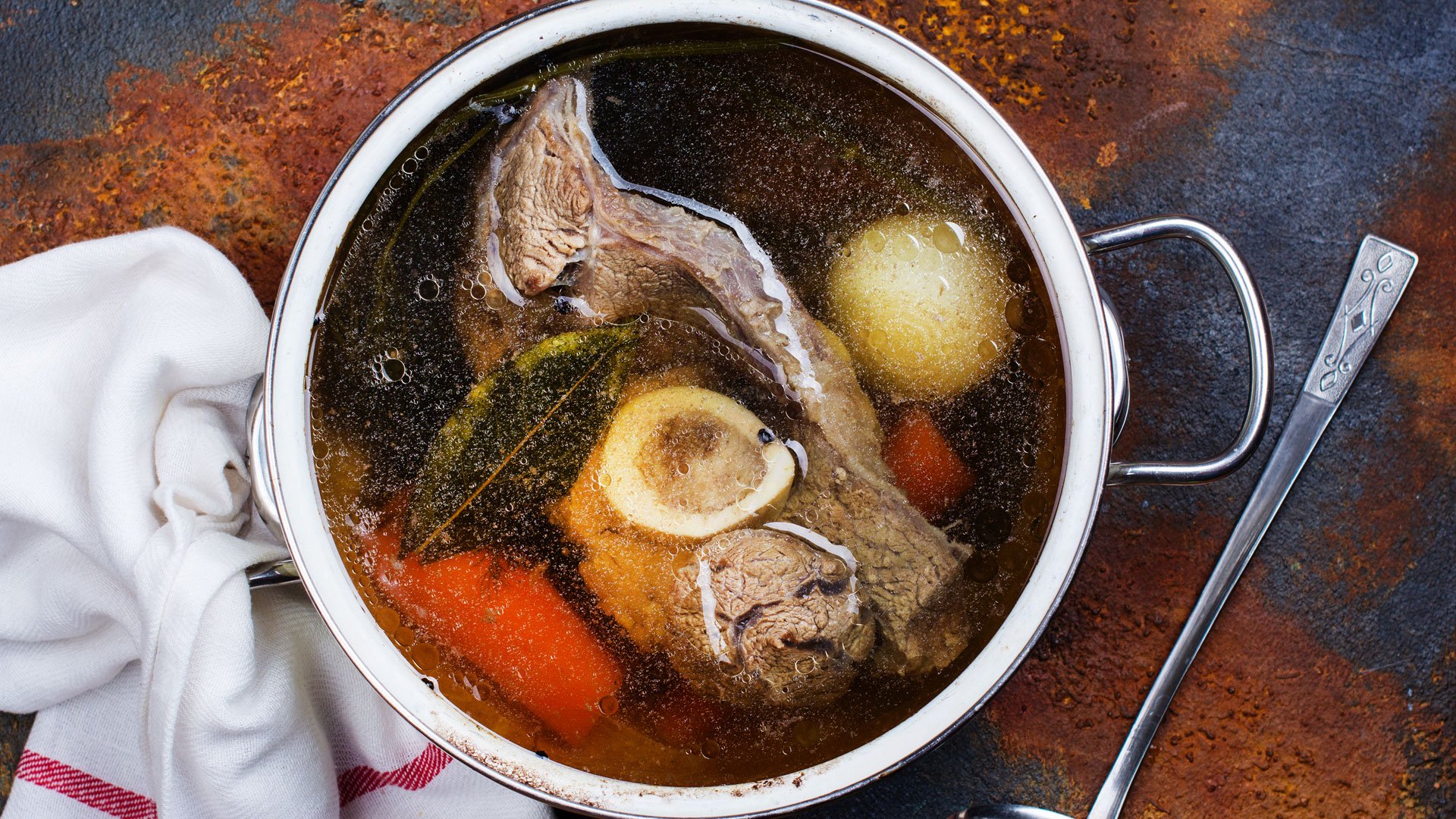Until recently, a collagen supplement was something that you’d put on your body, not in it.
For decades, people have used collagen topically in anti-aging creams. But recently there’s been a spike in collagen everything: pills and powders, whey-collagen supplement combos, bone broth, and other collagen-infused products.
Why the surge?
Collagen comes with some lofty health claims. Some suggest that taking just a single serving (about 2 tablespoons) of collagen powder per day can do everything from improve your workout performance, to strengthen your muscles, to lubricate your joints, to even improve your gut health
But at $50 for a one-month serving — double the price of most protein powders — there’s a hefty price tag to go along with all that big talk…only some of which is backed by science.
Should you buy in?
The results are mixed.
If you’re looking FOR COLLAGEN TO boost your workout, don’t believe the hype.
But if you’re hoping for healthier skin, the right product (not all collagen is created equal, so be sure to look at the label) might help you save money you might spend on other worthless products.
Here’s a guide that explains what collagen can do for you, with buying tips to help you make sure you don’t buy a collagen product that uses smoke and mirrors to sell you inferior ingredients.
What Is Collagen, Exactly?
Collagen is a fibrous protein that helps make up the connective tissues in your body. That means collagen is in your skin, hair, joints, bones, muscles, veins, and organs, explains Jonathan Valdez, R.D.N., owner of Genki Nutrition and a spokesperson for the New York State Academy of Nutrition and Dietetics.
More than 30 percent of your body’s structural protein is collagen, adds NYC-based registered dietitian Laura Cipullo, R.D., C.D.E.
All collagen is made up of amino acids, which are the building blocks of protein. Your body uses these amino acids to repair its tissues (think: muscles, bones, and joints), explains registered dietician Mary Ellen Phipps, M.P.H., R.D.N., owner of Houston-based Milk & Honey Nutrition. Basically, collagen is the glue that holds those tissues together and help them withstand stretch, Phipps says.
So it makes sense that products are trying to find ways to improve collagen, especially when you consider that collagen decreases when you get older.
Where Does Collagen Come From?

Like almost everything, you do not need a supplement to get collagen.
Collagen can be found in animal proteins like eggs, chicken, bone broth, and dairy, says Maggie Michalczyk, R.D.N. Your body will also naturally make collagen from certain amino acids and vitamins and minerals like vitamin A, vitamin C, and copper, she says. In fact, vitamin C is necessary for collagen formulation, so being deficient can harm your body’s natural production.
“The body’s collagen synthesis naturally decreases as we age, which means that, over time, our bodies aren’t producing collagen as quickly as they once were,” explains Valdez.
After about 25 to 30 years of age, your collagen levels start dropping by about 1 percent per year, which means that our bodies aren’t repairing themselves as fast as they once did, Michalczyk says.
Some blame that decrease in collagen production for their achy joints, slower muscle recovery, and sensitive stomachs.
“As the production of collagen decreases, some people anecdotally report symptoms like slower wound healing, greater instances of joint pain or an increase in frequency of broken bones,” says nutritional therapy practitioner Alexandra Rains, C.N.T, co-founder of Bonafide Provisions.
Ok, So Should I Take a Collagen Supplement?
When you learn that collagen decreases over time, it’s logical to conclude that, “Ok, well I’ll just take a collagen supplement. Problem solved.”
Unfortunately it’s not so simple.
“The studies done on oral ingestion of collagen are very limited and there’s a lot of false information out there,” says Valdez.
For starters, there’s no research that shows that the collagen we consume automatically gets turned into the collagen in our tissues.
Quick science refresher: Collagen, like all proteins, is made up of amino acids. The collagen you consume in a collagen powder is going to be broken down into those amino acids with the help of enzymes in the stomach, says Keri Gans, M.S., R.D.N.
That’s where we lose control of the process. Because just as you can’t eat cake and tell your body where to store fat, you have no say how amino acids will be used.

Instead, the amino acids derived from breaking down ingested collagen (or any other protein you eat) are distributed throughout the body based on which area needs them the most.
Because major organs like the heart and brain use collagen to function, it’s likely that you won’t immediately notice differences in your muscles, joints, or bones, says Phipps. But chances are you won’t really feel it in your heart and brain, either.
Think about it this way: B vitamins have been shown to be good for your heart, but we don’t feel better when we take a B-vitamin supplement, or eat lean meats or green leafy vegetables (which are rich in those vitamins).
Is Collagen Good For Skin Health?
If there’s an area that’s most promising, it’s collagen’s ability to help skin health. Most evidence surrounding oral collagen supplementation shows that it can improve skin complexion and reduce so-called imperfections.
For example, a recent review published in the Journal of Cosmetic Dermatology found that supplementing with oral collagen increased skin hydration after eight weeks, which suggests that taking collagen can help you beat dry, cracked winter skin.
Another study published in the Journal of Medicinal Food found that supplementing with collagen was effective at reducing the appearance of cellulite in women.
Is Collagen Good for Joint Aches and Pains?
If Collagen’s role with skin health is the most proven, then consider the potential for improving joint health as the most promising.
While there are very few studies performed — which means we need more time (and research) to know with certainty if collagen will help most people, type II collagen (aka collagen peptides) has shown more upside than other more common supplements, such as glucosamine and chondroitin.
According to Examine.com, a leader in supplement research, “The collagen in joint cartilage is 80–90% type-II collagen. Current research suggests that undenatured type-II collagen (UC-II) may reduce swelling, joint pain, and stiffness in cases of moderate-to-severe osteoarthritis and both juvenile and adult-onset rheumatoid arthritis.”
A study in the Journal of International Society of Sports Nutrition found that people with joint pain or mobility who took collagen for 4 months significantly improved joint function. Other research published in Current Medical Research and Opinion suggests that collagen supplements may lessen joint pain among college athletes. And more research published in the International Journal of Clinical Pharmacology Research found that collagen may decrease joint stiffness and pain in women.
Your move: because research is still young, if you’re dealing with pain and swelling, Valdez recommends that you go see a doctor or physical therapist before trying to “fix” the problem through a supplement or other nutritional change.
How Does Collagen Affect Bone Health?
While collagen may be good for your joints, claims that collagen is beneficial for bone density are unsupported.
For example, in a study published in the journal Maturitas, researchers found that collagen supplements did not improve bone health in postmenopausal women with osteopenia (a precursor to osteoporosis).
Another study published in the Journal of Agricultural And Food Chemistry did find that collagen increased bone density and had a beneficial impact on osteoporosis…in rats. Until there is evidence that collagen can improve bone density in humans, it’s best to set your expectations low.
Will Collagen Improve Your Workout Performance?

Like most supplements (creatine and caffeine being exceptions to the rule), there’s no magic pill hiding in collagen.
Many of the claims of boosted workout performance are based on one study published in the Journal of the American Dietetic Association, which suggested that taking collagen supplements may help preserve lean muscle in older women. There were many limitations within the study: it only involved nine healthy women over the age of 70, all of whom were given collagen supplements for 15 days.
The bigger issue: It’s likely those subjects would experience benefits from consuming any kind of protein, Gans says. Why? Because older women typically under-consume protein, and consuming protein has been found to help preserve lean muscle mass.
So if your goal is to build muscle and chase PR’s, you could just as easily supplement with a cheaper alternative such as whey protein, which also tends to have 15 to 20 grams of protein per scoop, compared to the typical 10-gram serving in collagen products. The choice is up to you and your budget.
What About Collagen and Gut Health?
We’ll keep it simple: like most products related to gut health, there is more speculation than science. There aren’t any studies that show collagen has a positive effect on gut health.
The Buyers Guide: Good Collagen vs. Ineffective Collagen
If you decide you want to try a collagen supplement, it’s important to know that all collagen is not created equal.
Collagen can come from multiple sources, such as gelatin, or in different variations such as hydrolyzed collagen or undenatured collage. Your GI tract will break down these proteins, meaning what you put into your mouth won’t necessary have any value after it goes through the digestive process.
Research in the International Journal of Clinical Pharmacological Research found that digestive enzymes break down hydrolyzed collagen. And something like gelatin is rendered almost useless.
Your option: either buy a product with the specific type of hydrolyzed collagen — “type II collagen” (sometimes labeled UC-II) — that has been shown to have benefits in research, or stick with a product that is purely collagen peptides. Both of these variations are more likely to make it through the digestive process and still provide value for your body.
If it doesn’t have type II specified or use collagen peptides, you should have less confidence that the product will deliver on its promises, no matter what the label claims.
To ensure that any supplements you take — collagen or otherwise — contain what they actually say they do (and nothing else), your best bet is to choose a tub that has been third-party tested by a company such as NSF International. You should see this mark right on the label, says Phipps.
However, people with sensitive stomachs may experience some discomfort like heartburn or nausea, says Valdez. So if you find it’s hard on your GI system, try a brand with fewer ingredients, take smaller servings, or consider stopping the supplements altogether.
How to Get More Collagen Naturally

While collagen supplementation may be beneficial for some, you don’t need to buy a product to add collagen to your diet. Your steps can be as simple as:
- Regularly eating vitamin C-rich foods such as citrus fruits, dark leafy greens, strawberries, and blueberries. Vitamin C is critical to collagen production, Gans says. That’s because vitamin C deficiencies are linked to a decline in natural collagen production, so prioritizing the vitamin may help keep your collagen levels up.
- Eating foods high in vitamin A, such as sweet potatoes, carrots, and spinach can also help. Much like vitamin C, vitamin A helps your body maintain its collagen levels.
- Eating protein-rich foods at meals and snacks, Gans says. Great options include animal proteins, eggs, and dairy.
- Making your own bone broth or stock. Valdez says that bone broths and homemade soups are jam-packed with collagen. You don’t need to go out and buy a bone broth mix from a store. You can make your own by simply putting bones (could be from chicken, beef, pork or a mix) into a large pot with water and veggies like carrots and celery. Add a couple of tablespoons of apple cider vinegar, and let boil for several hours. The real trick: the longer you let it boil, the more collagen you’ll receive from the broth (that’s what makes bone broth different from regular stock). If you want to max out the collagen you pull out, cook the bones on low for at least 24 hours. You can make bone broth quicker (say, a minimum of 6 hours of slow cooking), but less cook time means less collagen. And be sure to keep the heat on low to prevent the breakdown of the collagen, which makes it less “usable” by your body.
READ MORE:
What is the Best Protein Powder?
I didn’t know any of this, very informative article. Thank you.
Thank you for reading, Shane!
Thanks for the article on collagen, this is super informative and helpful!
We appreciate you reading it, Lauren, and are glad you enjoyed it!
I started making a bone broth at home and drinking it a couple of times a week and saw a marked improvement in my skin. I’m a big believer in getting everything you need from foods rather than supplements and only using supplements when absolutely necessary. I really enjoyed your article.
Thoughts on the new trend of liquid proteins infused, or suspended in collagen? Thinking that there is soon going to be a flood in the supplement market of copycat products since collagen is “hot” right now. Just wanted to know if you’ve seen any yet and your thoughts on them?
What are your thoughts on the new trend of liquid protein/collagen products that are starting to trend these days?
This is great article, it really helps me and give me some good information. Thanks for sharing.
Great article; Especially for the ladies who lose this important component quickly, after the age of 30. It is always better to have the natural sources for it, rather than the artificial forms. They should always be prescribed by a doctor or nutritionist.
Collagen is a vital protein and can be found easily in the body. Thanks for the complete guide along with the foods to include in diet. Keep writing.
I took a powder collagen and noticed nothing for over a year so I stopped. The last 6 months, I’ve been taking a liquid collagen and my hair is growing back after years of thin hair from post partum hormones… my friend has had the same results. My hair stylist keeps commenting on it so at this point, I don’t even care if it helps with anything else! Lol!!